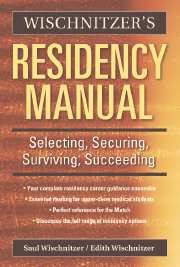Book contents
- Frontmatter
- Contents
- Tables and Forms
- Preface
- Message to the Reader
- Abbreviations
- PART ONE SELECTING A SPECIALTY
- 1 Considering Your Options
- 2 Selecting Your Specialty
- 3 Major Specialties
- 4 Medical Subspecialties
- 5 Surgical Subspecialties
- 6 Other Subspecialties
- PART TWO SECURING A RESIDENCY
- PART THREE SURVIVING A RESIDENCY
- PART FOUR SUCCEEDING IN PRACTICE
- Appendix 1 Major Professional Organizations
- Appendix 2 Sample Resumes
- Appendix 3 Personal Statement
- Glossary
- Bibliography
- Index
5 - Surgical Subspecialties
Published online by Cambridge University Press: 08 August 2009
- Frontmatter
- Contents
- Tables and Forms
- Preface
- Message to the Reader
- Abbreviations
- PART ONE SELECTING A SPECIALTY
- 1 Considering Your Options
- 2 Selecting Your Specialty
- 3 Major Specialties
- 4 Medical Subspecialties
- 5 Surgical Subspecialties
- 6 Other Subspecialties
- PART TWO SECURING A RESIDENCY
- PART THREE SURVIVING A RESIDENCY
- PART FOUR SUCCEEDING IN PRACTICE
- Appendix 1 Major Professional Organizations
- Appendix 2 Sample Resumes
- Appendix 3 Personal Statement
- Glossary
- Bibliography
- Index
Summary
Overview
Surgery has been the major alternative treatment modality to medicine since the profession was placed on a sound scientific footing. The introduction of anesthesia and the multitude of advances made in this field have dramatically enhanced the opportunities for the performance of surgery. Recognition of the critical importance of antisepsis, combined with the introduction of antibiotics, has allowed highly successful outcomes of surgical intervention. Consequently, advances in surgery have had a profound impact on the quality of health and have contributed significantly to the extension of life.
As a result of fundamental advances in patient care, as well as major technological breakthroughs, it became possible to apply therapeutic surgical approaches in all body areas. Consequently, a significant number of surgical subspecialties have evolved. Surgery is also a component of several major specialties, such as ophthalmology, otolaryngology, obstetrics/gynecology, and urology. The introduction of microsurgical, laparoscopic, and laser techniques has further expanded the potential of the field significantly and diminished the inherent risk of surgery for most patients.
Characteristics
Table 5.1 summarizes the characteristics of the surgical subspecialties. A detailed discussion of each of them follows.
The choices
Seven surgical subspecialties will be discussed below.
Colon and rectal surgery
Status: Surgical subspecialty
Projected need: Above average
Securing a residency: Competitive
Training programs: Ca. 50
Positions open: Ca. 60 (women residents ca. 10)
Training.: One year (after a five-year general surgery residency)
Weekly patient contact hours: Above average
Attaining patients: By referral
Remuneration: Starting, above average; median, well above average
Night and emergency calls: Occasional
scope. Colon and rectal surgeons apply their skills in the diagnosis and treatment of problems associated with the large intestine, rectum, and anal canal, as well as the perineal region.
- Type
- Chapter
- Information
- Wischnitzer's Residency ManualSelecting, Securing, Surviving, Succeeding, pp. 78 - 90Publisher: Cambridge University PressPrint publication year: 2006

